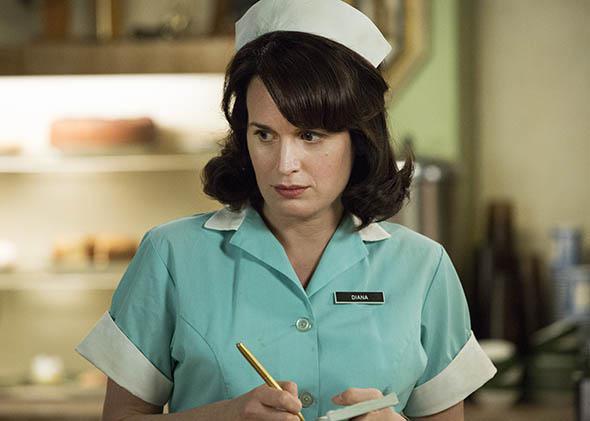Hanna, John,
You guys missed the most stunning development in this episode: Meredith has become a competent secretary! Don’s girlish, blond, bow-bedecked assistant has never been the brightest bulb in the firm’s secretarial pool—she’s the one he had to spell the word “strategy” for back in Episode 705. But now she’s dropping knowing jokes about cheap perfume, fetching grief-dulling sandwiches unprompted, doing unsolicited research for Monday’s still-on meeting with Menken’s department store: She’s a pro.
I’m also surprised you both weren’t more shocked by Don’s back-alley assignation with his Somber Pixie Waitress Girl. I agree, Hanna, that the waitress character’s final speech about death contributed nothing we hadn’t already gleaned from Don’s fraught and evocative conversation with Rachel’s sister. (I loved that sister character—think of all the sisters of Don’s conquests who could likely say with similar fire: “I know who you are.”) But that brick-wall fuck was maybe the ugliest thing I’ve seen Don do. Of course, we’ve seen Don have all kinds of sex, and we’ve seen him pay for sex before, too. But the show has generally indulged the idea that Don is both deeply desirable and deeply sensitive to the women who desire him. It has very rarely shown us a woman not wanting Don, and it certainly hasn’t shown us a Don who can’t read the desire in the room. In this scene, though, he honestly had no conception that the waitress was just getting something over with. The sexual obliviousness on display was grotesque. And then, even after he’d grokked what really went on, he had the temerity to go back for a chat about mortality and his dreams? What a gross, clueless old lech.
Maybe you’re right, Hanna, that Weiner is fattening up our heroes and will roast them into ’80s greed birds—this new low in Don’s likability suggests that perhaps there’s no redemption ahead. But there’s something about your theory I don’t quite get. You noted that when you interviewed him, Weiner was contemptuous of ’60s idealists for curdling into craven capitalists. But our characters aren’t the idealists of the ’60s. They are a notch older, generationally, and a notch more conservative (in that their careers have required them to serve corporations and consumerism throughout this time). The show has always held the idealism of the ’60s at arm’s length—and I think one of the points of the show is that most people did. Maybe that’s Weiner’s stab at explaining how ’60s idealism could deflate so fast. It was never that big in the first place.
Hanna, I didn’t mind the misdirection of the dreamlike scene that opened the show, or Don’s dream sequence with Rachel. The opening fur session was our last big WHAT YEAR IS IT? WHERE ARE WE? WHO IS DON SLEEPING WITH? moment of the series, so I didn’t mind that Weiner chose to live it up. (For a moment I wondered if it was a flashback to the old fur days, although the model’s makeup and comportment ruled that out.) And I thought the other spooky coincidences—Don dreaming of Rachel before learning she’s died; Ken’s wife suggesting he quit the night before he gets fired—served to underscore the futility of chasing fate or thinking about “the life not lived,” as Ken says in a moment of bravado before he puts the last nail in Dave Algonquin’s coffin and signs on with Dow.
John, you asked why Don is so moved by Rachel’s death. Why Rachel and not some other past paramour? I’m not sure, but I can tell you this spooky coincidence: When I was writing my preview post for this TV Club, I almost included a line to the effect that it’d be nice to see some of Don’s old flames and that Rachel would be at the top of my list. I suspect that’s not because I am clairvoyant, but because Rachel was the first woman we saw Don fall for—he offered to leave Betty and run away with her. She refused—smart woman—because she suspected that she was just a placeholder in Don’s fantasy of a new life. But Don still can’t see that she was right. He thinks Rachel might have been his life not lived, a Megan who might have worked out. (Until the leukemia, of course.) “I’m supposed to tell you,” dream Rachel says, “you missed your flight.” Don’s subconscious isn’t very subtle.
Speaking of which, there was one true groaner line in this episode: Ted Chaough saying, leeringly: “Apparently hemlines are going up.” C’mon, team. As historical dialogue goes, that’s Pan Am level. That’s some Playboy Club ish. Luckily Ted’s groovy new outfit made up for it. And I’m glad he isn’t sniffing around Peggy.
Man, I’m going to miss Peggy Olson when this show is over. You’re right, Hanna, that the veal scene was my favorite—and her burgeoning romance with Stevie is so charming that I’m sure it’s doomed. (Will he never call? Or call but somehow she’ll ruin it anyway? Either way I don’t think she’s going to Paris.) But Peggy has settled into a better version of herself since 1968: She seems steady in her own self-knowledge, clear and confident about what she wants. I love the brisk, warm but firm way she interacts with Johnny: “If you want a raise, stop acting like a secretary”; then when he tries to set her up, “It’s very sweet, but I really have to question your judgment”; and eventually when he offers Paris tips, “I don’t know where I’m going, but you have work to do.” Sure, she feels a little silly about her hot-and-heavy first date, but “it’s nothing a couple aspirin won’t fix.”
Vi, I’m taking my break,
Julia
Read the previous entry, by Hanna Rosin | Read the next entry, by Hanna Rosin
